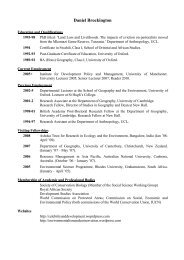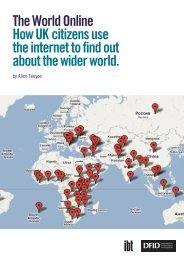World
Viewing the world - Full report
Viewing the world - Full report
- No tags were found...
Create successful ePaper yourself
Turn your PDF publications into a flip-book with our unique Google optimized e-Paper software.
B. SummariesB.1.Content Study(Glasgow Media Group)B.1.1. SampleThe sample covers all main news programmes broadcaston networked terrestrial television channels in the UK,from 1 January to 31 March 1999. This included BBC1(The One O’clock News, The Six O’clock News, The Nine o’clockNews) and ITV (Lunch Time News, News at 5.40 and News atTen), Channel Four News, BBC2’s Newsnight and the twomain bulletins on Channel 5.Non-news programme output analysed over the sameperiod covered the terrestrial channels as well as somecable and satellite broadcasting in March 1999. Theresults of this are included in the detailed analysis ofindividual news stories and in the studies of non-newsoutput.The developing world was defined as all thosecountries outside Europe, North America, Japan,Australia and New Zealand and the countries of EasternEurope formerly within the Soviet ambit. These are listedin the Appendix.B.1.2. TV NewsB.1.2.1. General profileOf the 137 countries of the developing world there wasno discussion of or reference to 65 of them. A furthersixteen were mentioned only in the context of reportingsports events, visits from Westerners, wildlife orbizarre/quixotic stories (such as a round-the-worldballoon travelling over them).Overall, Channel Four News carried many more storieson the developing world than other programmes.Channel Four News and Newsnight were also much morelikely to cover stories outside the rather limited andnegative coverage of disaster, conflict and westernvisitors. Newsnight especially had a high proportion ofpolitical coverage. Although most of the news wasconcerned with recent events and tended to be limited toreporting visible activities, some news programmes didmake an effort to produce longer and more contextualspecial reports, giving the background necessary forunderstanding and sometimes providing positive storiesfrom developing countries.Other news programmes offered more limitedreporting of the developing world. About 80% ofChannel Five’s coverage featured conflict, disasters,western visitors and the bizarre. ITN’s lunch-time newswas only marginally different with over 75% of itscoverage on the same topics. The high level of sport onChannel Five was also noteworthy in the context of theChannel’s generally minimal level of coverage of thedeveloping world. BBC news tended to include lesspopulist coverage than the mainstream ITN bulletins.The BBC’s One O’clock News did however broadcast twiceas many disaster stories as the other BBC bulletins, butdid not provide contextual reporting of the aftermath ofthe events (in contrast to the Nine o’clock News), in theperiod of this sample.B.1.2.2. Case studiesA number of case studies were selected for detailedanalysis. Each was chosen because it was a typicalexample of the most frequent categories of TV newscoverage. The major categories were:● trade/finance (the banana war)● politics (Nigerian elections)● conflict/war/terrorism (killing of tourists in Uganda)● disasters/accidents (Colombian earthquake)A Newsnight special on education in Tanzania was alsoexamined, as well as BBC and ITN reports on the longtermeffects of, and responses to, Hurricane Mitch inCentral America.THE BANANA WARThe main focus of the coverage was on potentialconsequences of the dispute, with most emphasis placedon possible effects on British and European industry,and the potential for damage to the relationship betweenthe two Western trading blocks. The potential fordevastation of the economy of several Caribbeancountries was given less attention. The <strong>World</strong> TradeOrganisation (WTO) was referred to as the arbiter in thedispute, but there was very little discussion of the historyor role of this organisation. Only Sky News referred to thepossibility of job losses on both sides of the Atlantic. Thepower of multinational companies was referred to byChannel 4 and both BBC news channels in relation to therole of the American banana company Chiquita. No linkwas made between the power of the multinationals andtheir influence in the WTO. Following the initialcoverage of the dispute in March 1999, the story was notfollowed up, though a final decision had not been madeby the end of that year.DFID – July 2000 5





